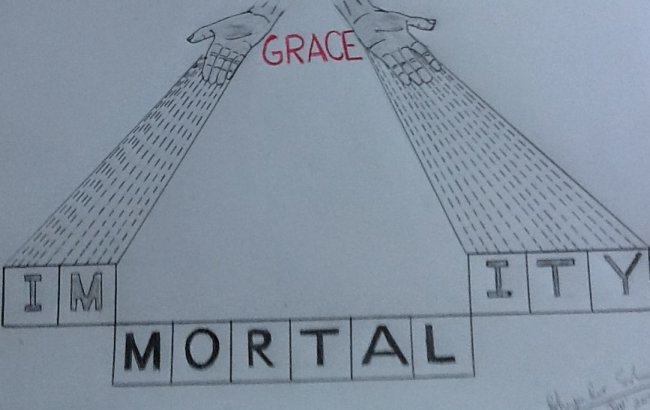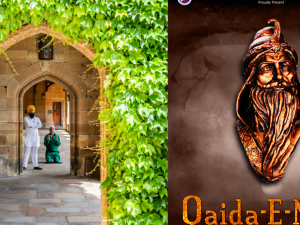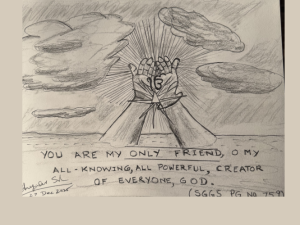Immortality for the human mortal being sounds like a utopian fantasy, unreal. The bottom-line reality is we are all born to die one day. It is a transient world, where everything comes with an expiry date. Yet we yearn for a longer life, and if someone brings up this subject of death, rest are quick to brush it aside, with a snide remark that we don’t want it to be discussed. Even Sri Guru Granth Sahib (SGGS) in multiple places confirms our mortal reality in these words:
ਮਰਣੁ ਲਿਖਾਇ ਮੰਡਲ ਮਹਿ ਆਏ ॥
“Maran likhai ma(n)ddal meh aae.” (SGGS, Pg. No. 685)
Translation: Destined only to die (spiritually), one comes into the world.
ਜੋ ਆਇਆ ਸੋ ਚਲਸੀ ਸਭੁ ਕੋਈ ਆਈ ਵਾਰੀਐ ॥
“Joe aaiaa so chalasee sabh koiee aaiee vaareeaai.” (SGGS, Pg. No. 474)
Translation: Whoever has come, shall depart; to all shall come their turn.
ਜੋ ਦੀਸੈ ਸੋ ਸਗਲ ਬਿਨਾਸੈ ਜਿਉ ਬਾਦਰ ਕੀ ਛਾਈ ॥
“Joe dheesai so sagal binaasai jiau baadhar kee chhaiee.” (SGGS, Pg. No. 219)
Translation: Whatever is seen, shall all pass away (in due course), like the shadow of a cloud (will not last forever).
ਸਭਨਾ ਮਰਣਾ ਆਇਆ ਵੇਛੋੜਾ ਸਭਨਾਹ ॥
“Sabhanaa maranaa aaiaa vechhoRaa sabhanaeh.” (SGGS, Pg. No. 595)
Translation: Death comes to all, and all must suffer separation.
ਕਰਨਾ ਕੂਚੁ ਰਹਨੁ ਥਿਰੁ ਨਾਹੀ ॥
“Karanaa kooch rahan thir naahee.” (SGGS, Pg. No. 793)
Translation: Everything departs; nothing remains (here) forever.
From these above quotes the reality of the transitory nature of our earthly existence is again reconfirmed. If death is a reality of life, then an offer of immortality by the enlightened Gurus, prophets, etc. is very alluring, and enticing. Since the time immemorial humans have desired immortality and have experimented with ways to acquire it without much success. In fact, there has been partial success as mortality rates have gone down and life spans have increased, medical interventions do save lives and also can make us look younger for a longer period. So, overall, there has been some progress, but still the constraints of biology, does not change the landscape on when life ends. With all the arsenal at our disposal we have tried to change the landscape, and yet the reality remains unchanged. Guru Ji is positing us to transport ourselves to another world, free of worries. So, if we can follow the guidance of the enlightened then from a mortal being, we can achieve immortality. Success in these efforts can make us the citizen of the city of immortality:
ਅਮਰਾ ਪੁਰ ਬਾਸਾ ਕਰਹੁ ਹਰਿ ਗਇਆ ਬਹੋਰੈ ਬਿਤ ॥੧੬੩॥
“Amaraa pur baasaa karahu har gaeiaa bahorai bit. 163.” (SGGS, Pg. No. 1373)
Translation: You shall dwell in the city of immortality, and you could reactivate your wealth (of spiritual immortality) that you squandered away (in the wild chase for acquisition of the material wealth, and possessions). ||163||
With the abode in the city of immortality, the life will be forever as Guru Ji informs in these words:
ਜੁਗੁ ਜੁਗੁ ਜੀਵਹੁ ਅਮਰ ਫਲ ਖਾਹੁ ॥੧੦॥
“Jug jug jeevahu amar fal khaahu. 10.” (SGGS, Pg. No. 343)
Translation: You shall live throughout the ages, eating the fruit of immortality. ||10||
By becoming a citizen there, they will not experience mortality again. Guru Ji says:
ਨਿਜ ਘਰਿ ਮਹਲੁ ਪਾਵਹੁ ਸੁਖ ਸਹਜੇ ਬਹੁਰਿ ਨ ਹੋਇਗੋ ਫੇਰਾ ॥੩॥
“Nijh ghar mahal paavahu sukh sahaje bahur na hoigo pheraa. 3.” (SGGS, Pg. No. 13)
Translation: Within the home of your own inner being, you shall obtain the Mansion of peace and joy. You shall never take birth again or die in the wheel of reincarnation. ||3||
Besides these quotes above there are quite a few additional quotes about immortality in SGGS. Here an alternative world reality is being offered to us. Guru Ji is saying our real home is not in this mortal world, but it is in the immortal realm.
So, how do we reconcile these two opposite realities? Unfortunately, this aspect of life is not shared anywhere, not even in the places of worship. In order to embark on that path, awareness has to be awakened and sharpened. It is not something that can be acquired from the study of books or listening to discourses of the educated, scholars, or the seasoned orators. Because this knowledge is not a piece of data or information, but an inner experience. Its experience transforms life, perspectives, and outlook towards life. It is something like a statement from the doctor that ‘you have cancer’ transforms you from within. Then it is not a mere information anymore, as it becomes a deeply felt reality, with scary ramifications. These few words from the doctor are enough to change our perspective of life, priorities as the end of life now appears more imminently closer than before. The implication is that there is change to our approach to life, reset in the priorities. Grace completes the transformation.
Such a startling transformation took place in 1532, when Bhai Lehna came to meet Guru Nanak Dev Ji in Kartarpur. Bhai Lehna had just spent one evening, and the next morning with Guru Ji, but it had induced a profound transformation in him. There was not much of an academic or intellectual exchange that took place in these encounters, but its significance and repercussions were life transforming. Bhai Lehna, leading a team of devout pilgrims of goddess Durga from his own place of Khadur to Jawalamukhi, had stopped for a night’s halt near Kartarpur. Bhai Lehana took a leave from his party telling them that he was going to meet someone. But that encounter changed the course of his life. So deep was the impact of that encounter that he returned back from this meeting the next day to inform his party that he was not going to lead or go on pilgrimage with them. He informed them to make their own arrangements for the pilgrimage as he had found his own destination. He spent the next seven years of his life in a dedicated service of Guru Nanak. During this stay Bhai Lehna was totally transformed through their daily exchanges that Guru Ji anointed him as his spiritual successor. During the course of this stay, Bhai Lehna had experienced immortality. Guru Ji rechristened him as Angad, which means part of me; and bowed his head down to his own disciple, while anointing him as his successor. This was unheard of during those times, that the master had bowed down to his own disciple.
We have seen Guru Ji’s words and how they transform lives still our skeptic mind refuses to offer immortality. But if the words are inscribed in Sri Guru Granth Sahib (SGGS), then we have to believe them to be true. Let us try to understand how a mortal life can become immortal through the road map Guru Ji has provided, Guru Ji says:
ਆਗਾਹਾ ਕੂ ਤ੍ਰਾਘਿ ਪਿਛਾ ਫੇਰਿ ਨ ਮੁਹਡੜਾ ॥ ਨਾਨਕ ਸਿਝਿ ਇਵੇਹਾ ਵਾਰ ਬਹੁੜਿ ਨ ਹੋਵੀ ਜਨਮੜਾ ॥੧॥
“Aagaahaa koo traagh pichhaa pher na muhaddaRaa. Nanak sijh ivehaa vaar bahuR na hovee janamaRaa. 1.” (SGGS, Pg. No. 1096)
Translation: Look ahead (in the future); don't turn your face backwards (looking at your past deeds). O Nanak, be successful (in human life) this time, and you shall not be reincarnated again. ||1||
Guru ji has used a poetic expression to provide us this road map. By saying don’t look back Guru Ji not restraining from the introspection but asking us not to repeat the things that you have done in the past. Instead, Guru Ji wants us to charge forward in the right direction to achieve immortality. So, charging forward means the remaining life should not become rut as in the past, instead there should be a change. Let us ask Guru Ji what we have been doing in the past:
ਬੈਰ ਬਿਰੋਧ ਕਾਮ ਕ੍ਰੋਧ ਮੋਹ ॥ ਝੂਠ ਬਿਕਾਰ ਮਹਾ ਲੋਭ ਧ੍ਰੋਹ ॥ ਇਆਹੂ ਜੁਗਤਿ ਬਿਹਾਨੇ ਕਈ ਜਨਮ ॥
“Bair birodh kaam karodh moh. JhooTh bikaar mahaa lobh dhroh. Eiaahoo jugat bihaane kiee janam.” (SGGS, Pg. No. 267)
Translation: Hate, conflict, lust, anger, emotional attachment, falsehood, corruption, immense greed, and deceit: So many lifetimes are wasted in these ways.
The transformation begins with the attention to these negative traits within. The change will be that the earlier negative traits should not be repeated moving forward, becoming a thing of the past, with the remaining life moving in the positive direction. So, when Guru Ji is talking about looking ahead at the future, Guru Ji is cautioning against misdirected or wasted efforts (by repeating the past mistakes).
The humans are all desirous of immortal, joyous, and blissful lives. Yet this world where we are looking for everlasting bliss is a transitory world, so attaching ourselves with anything in this world is only going to give us temporary joy. Guru Ji wants us to get attached to Immortal alone, to enjoy the everlasting bliss. So how to change the course from the present? Becoming a hermit or a renunciate in life will not achieve it, nor that is being advocated by Guru Ji. All the enlightened Gurus, Bhagats, Saints, or those on the path of spirituality teach us the unviability of becoming detached through the disengagement process. They themselves led an active, engaged, and productive life, and they expect the same from us. As every attempt on that front of disengagement will only run counter, producing more dissonance and conflict. Also, the efforts to fix the world without fixing the self’s life will only aggravate the situation, resulting in escalation of dissonance alone. The challenges in the world have existed in the past and will continue to exist in the future as well, no one has ever eliminated those challenges, nor will anyone ever do it. Let us look at the history of wars, the lessons learnt, and the remedial measures implemented after earlier wars have not prevented the next one. If we look back, we already had two World Wars, and today we find ourselves on the brink of a third world war. Which could turn into a nuclear war, with millions of deaths and devastation on a scale not seen before.
Guru Ji wants us to take care of our life and soul first. Guru Ji has proposed that the solution lies with our becoming one with Immortal, then we can do good for the rest of mankind. Guru Ji asks us to prepare for it:
ਨਿਕਸੁ ਰੇ ਪੰਖੀ ਸਿਮਰਿ ਹਰਿ ਪਾਂਖ ॥ ਮਿਲਿ ਸਾਧੂ ਸਰਣਿ ਗਹੁ ਪੂਰਨ ਰਾਮ ਰਤਨੁ ਹੀਅਰੇ ਸੰਗਿ ਰਾਖੁ ॥੧॥ ਰਹਾਉ ॥
“Nikas re pankhee simar har paankh. Mil saadhoo saran gahu pooran raam ratan heeare sang raakh. 1. Rahaau.” (SGGS, Pg. No. 204)
Translation: O soul-bird! Come out (of the nest of attachment to the mortal world) and let the meditative remembrance of the Lord be your wings. (Those wings will let you fly out of the nest of attachment.) Meet the Holy Saint, take to His Sanctuary, and keep the perfect jewel of the Lord enshrined in your heart. ||1||Pause||
It is through the association with those who are attached to Immortal one, can we change our course. Sometimes outward appearance could be deceptive. Those attached to Immortal may seem to be attached to be worldly. But inwardly they have become one with the Immortal, through their own realization. It is only when becoming one with Immortal takes place, then detachment takes place naturally, as something more precious has been experienced. Afterall Immortal is forever, and if one has merged in, fully integrated with it, nothing else remains to be achieved. Let us look at some insights from Sri Guru Granth Sahib on it that experience of oneness:
ਸਹਜ ਗੁਫਾ ਮਹਿ ਆਸਣੁ ਬਾਧਿਆ ॥ ਜੋਤਿ ਸਰੂਪ ਅਨਾਹਦੁ ਵਾਜਿਆ ॥ ਮਹਾ ਅਨੰਦੁ ਗੁਰ ਸਬਦੁ ਵੀਚਾਰਿ ॥ ਪ੍ਰਿਅ ਸਿਉ ਰਾਤੀ ਧਨ ਸੋਹਾਗਣਿ ਨਾਰਿ ॥੩॥
“Sahaj gufaa meh aasan baadhiaa. Jyot saroop anaahadh vaajiaa. Mahaa anandh gur sabadh veechaar. Pria siau raatee dhan sohaagan naar. 3.” (SGGS, Pg. No. 370)
Translation: I have obtained a seat in the cave (abode for meditation for the yogis) of Celestial bliss and total calmness. (As a result, I hear) the celestial music of God, the embodiment of light. I am in ecstasy, reflecting on the Word of the Guru's Shabad. Imbued with my Beloved Husband Lord, I am the blessed, happy soul-bride. ||3||
The literal translation of the word ‘Sahaj’ is poise/equipoise or celestial bliss, which fail to do proper justice to its import. This is a state of mind that is very steady, totally calm, free from swings of opposing thoughts, unaltered by turmoil of thoughts or the challenging circumstances, and it is uninterrupted (Ik Raas). So, we will use the word ‘Sahaj’ to describe that feeling. Those who become resident there become pleasing to God, while becoming free from the web of mortality. The cave of celestial bliss that Kabir Ji talks about is nothing other than merger with Divine Supreme Being, who is Immortal. In fact, the experience of immortality in life manifests as the calmness of mind or ‘Sahaj’. Those who attain ‘Sahaj’ have mentally moved to another world, while physically they may still be living in this world. Such persons with Sahaj lead of contentment, their life’s imprint is harmless and peaceful. Ravidas Ji has painted a complete picture of Sahaj and also expressed that feeling of comradery with the fellow citizens of that city in these words:
ਕਹਿ ਰਵਿਦਾਸ ਖਲਾਸ ਚਮਾਰਾ ॥ ਜੋ ਹਮ ਸਹਰੀ ਸੁ ਮੀਤੁ ਹਮਾਰਾ ॥੩॥੨॥
“Kaeh ravidas khalaas chamaaraa. Joe hum saharee su meet hamaaraa. 3.2.” (SGGS, Pg. No. 345)
Translation: Says the emncipated shoemaker Ravidas, I have obtained freedom from mortal realm and those citizens there (in Immortal world), are my friends. ||3||2||
Ravidas has expressed the comradery, alignment in thoughts and viewpoints with those who have experienced immortality share. It is legendary, as the rest of world is at loggerheads with everybody else. Such alignment we don’t experience in the mortal world. The other traits of Sahaj as shared by Ravidas in the same shabad are summarized as under:
- Free from suffering and anxiety
- No taxes or duties on commodities
- No fear of downfall, crime or committing sin
- City of lasting peace and safety
- The Kingdom is eternal and ever stable
- All are equal no one second or third (non-discriminatory nature)
- All residents are eminent, endowed with the inner wealth and richness
- Have total freedom and liberty of action
- Have open and free access and connection to God
Those who achieve this while alive are not just pleasing and dear to God but with Him as well:
ਹਰਿ ਕੇ ਸੇਵਕ ਜੋ ਹਰਿ ਭਾਏ ਤਿਨ੍ਹ੍ਹ ਕੀ ਕਥਾ ਨਿਰਾਰੀ ਰੇ ॥ ਆਵਹਿ ਨ ਜਾਹਿ ਨ ਕਬਹੂ ਮਰਤੇ ਪਾਰਬ੍ਰਹਮ ਸੰਗਾਰੀ ਰੇ ॥੩॥
“Har ke sevak jo har bhaae tin(h) kee kathaa niraaree re. Aaveh na jaeh na kabahoo marate paarabraham sa(n)gaaree re. 3.” (SGGS, Pg. No. 855)
Translation: Those who are pleasing to the Lord are the servants of the Lord; their story is unique and singular. They do not come and go, and they never die; they remain with the Supreme Lord God. ||3||
They have freed themselves of vices such as lust, anger, greed, attachment, and pride, that affect the rest of mankind. If more mortals can become interested in immortality, then its cascading outcome will be lessening of worldly problems. In other words, their lives will become a solution for the world instead of being a problem. Guru Ji wants us to build our house, where they have built their own:
ਨਾਨਕ ਬਧਾ ਘਰੁ ਤਹਾਂ ਜਿਥੈ ਮਿਰਤੁ ਨ ਜਨਮੁ ਜਰਾ ॥੪॥੬॥੭੬॥
“Nanak badhaa ghar tahaa(n) jithai mrit na janam jaraa ||4||6||76||” (SGGS, Pg. No. 44)
Translation: Nanak builds his house upon that site where there is no death, no birth, and no old age. ||4||6||76||
Living in the mortal world, we all face the challenges of disease, old age, and death, which is engulfing everyone. But for the bona fide citizens of that town of immortals these maladies fail to affect or cast their influence. Bhagat Ravidas named that place as the city without sorrows in these words:
ਬੇਗਮ ਪੁਰਾ ਸਹਰ ਕੋ ਨਾਉ ॥ ਦੂਖੁ ਅੰਦੋਹੁ ਨਹੀ ਤਿਹਿ ਠਾਉ ॥
“Begam pura sahar ko naau. Dhookh a(n)dhoh nahee teh Thaau.” (SGGS, Pg. No. 345)
Translation: Begam Pura, 'the city without sorrow', is the name of (my) town. There is no suffering or anxiety there.
When one is emotionally elevated, stress-free, then depression, suffering and anxieties will not be experienced. Instead, a feeling of peace and ecstasy will be experienced there:
ਨਿਰੰਕਾਰ ਕੈ ਦੇਸਿ ਜਾਹਿ ਤਾ ਸੁਖਿ ਲਹਹਿ ਮਹਲੁ ॥੩॥
“Nirankaar kai dhes jaeh taa sukh laheh mahal. 3.” (SGGS, Pg. No. 595)
Translation: When you arrive in the land of the Formless Lord, you shall find peace in the Mansion of His Presence. ||3||
The land of “Nirankaar” also is called “Sahaj”, is the realm of immortality which is altogether a different realm. It is only on moving from the mortal world and residing in that immortal world can the eternal bliss and its comforts can be experienced. There is a complete absence of stressful challenges that bog us down in the mortal world. The state of mind there can be compared to that of the royalty. This abode of immortality will never be lost or ever has to be surrendered.
On this earth alone the number of countries are multiple, the result is fights, wars, rivalries and competition among the countries and its people. But when ‘Sahaj’ is experienced then conflicts, and one upmanship will be replaced with a feeling of unity and camaraderie. Only those blessed with inner richness and wealth become residents there. They have complete freedom to choose where to dwell or pick a place to visit or stay. The address and description of that place by Kabir is:
ਕਬੀਰ ਗੰਗ ਜਮੁਨ ਕੇ ਅੰਤਰੇ ਸਹਜ ਸੁੰਨ ਕੇ ਘਾਟ ॥ ਤਹਾ ਕਬੀਰੈ ਮਟੁ ਕੀਆ ਖੋਜਤ ਮੁਨਿ ਜਨ ਬਾਟ ॥੧੫੨॥
“Kabir gu(n)g jamun ke a(n)tare sahaj su(n)n ke ghaaT. Tahaa kabirai maT keeaa khojat mun jan baaT ||152||” (SGGS, Pg. No. 1372)
Translation: Kabir, between the Ganges and Jamuna Rivers, on the shores of Celestial bliss and Silence,
Kabir has made his home. The silent sages and the humble servants of the Lord search for the way to get there. ||152||
The meaning and implication of the word Sahaj has been discussed here. The silence being mentioned is the absence of desire for the acquisition of material possessions. What Kabir is claiming is that I have found the place which all the holy people as ‘Jans’ and ‘Munis’ are desperately looking for, I have found. I have built my house there, on the shores of the rivers Ganga and Jamuna. Kabir is not referring to bodies of water called rivers, but he is using those names to represent sahaj (shj) and sunn (suMn), the metaphors for poise and calmness. The confluence of these two virtues is the experience of immortality while alive.
Ganga -Sahaj (shj) meaning poise or stillness and
Jamuna - Sunn (suMn) meaning calmness, silence, or absence of desires
Elsewhere Kabir has expressed the result of growing these two virtues within, is that a person becomes free of desires in these words:
ਸਹਜ ਸੁੰਨਿ ਇਕੁ ਬਿਰਵਾ ਉਪਜਿਆ ਧਰਤੀ ਜਲਹਰੁ ਸੋਖਿਆ ॥ ਕਹਿ ਕਬੀਰ ਹਉ ਤਾ ਕਾ ਸੇਵਕੁ ਜਿਨਿ ਇਹੁ ਬਿਰਵਾ ਦੇਖਿਆ ॥੩॥੬॥
“Sahaj su(n)n ik biravaa upajiaa dharatee jalahar sokhiaa. Kaeh kabir hau taa kaa sevak jin ih biravaa dhekhiaa. 3.6.” (SGGS, Pg. No. 970)
Translation: In (the soil) of poise and calmness, the one tree rises up; it completely soaks up the water of desires from the ground. Says Kabir, I am the servant of those who have seen this celestial tree (within themselves). ||3||6||
So, this achievement is an extraordinary one and Kabir Ji is enjoying its bliss. He is even willing to become a servant of those who achieve this extraordinary feat. Guru Arjan has used the term cave (SGGS, Pg. No. 370) to describe that abode, also has been described as ‘Amaraa pur’ and ‘Begam pura’.
Conclusions:
1. Guru Ji says remember that death is certain in this mortal, transient world where everything comes with an expiry date and exists for a limited time only. Guru Nanak Ji gave this stark reminder to a Mullah in these words and same applies to us all:
ਮਰਣਾ ਮੁਲਾ ਮਰਣਾ ॥
“Maranaa mulaa maranaa.” (SGGS, Pg. No. 24)
Translation: Death, O Mullah-(remember) death will come (one day).
- However, when immortality is experienced by the mortal while still alive, then one will not have any fear of death, nor will be attached to the perishable world. Rather, one starts looking forward to death excitingly as with that physical death, the soul in the body will merge in the Immortal, as Kabir ji has expressed it in these words:
ਕਬੀਰ ਜਿਸੁ ਮਰਨੇ ਤੇ ਜਗੁ ਡਰੈ ਮੇਰੇ ਮਨਿ ਆਨੰਦੁ ॥ ਮਰਨੇ ਹੀ ਤੇ ਪਾਈਐ ਪੂਰਨੁ ਪਰਮਾਨੰਦੁ ॥੨੨॥
“Kabir jis marane te jag ddarai mere man aana(n)dh. Marane hee te paieeaai pooran paramaana(n)dh. 22.” (SGGS, Pg. No. 1365)
Translation: Kabir, the (entire) world is afraid of death (getting detached from the material world)- that death fills my mind with bliss. It is only by its death that perfect, supreme bliss (Immortality) is obtained. ||22||
- The only way immortality can be experienced is through the mortal life journey. That experience is also known by other terms as Nirvana, Param Padh etc. It is dying only not to be born again, but to live eternally merged with the Immortality. It is a state of profound spiritual joy, bliss, without any negative emotions or fears. Guru Ji has expressed it as:
ਜੀਵਤ ਮਰੈ ਮਰਿ ਮਰਣੁ ਸਵਾਰੈ ॥ ਗੁਰ ਕੈ ਸਬਦਿ ਸਾਚੁ ਉਰ ਧਾਰੈ ॥੧॥ ਰਹਾਉ ॥
“Jeevat marai mar maran savaarai. Gur kai sabadh saach ur dhaarai. 1. Rahaau.”
(SGGS, Pg. No. 1174)
Translation: One who dies while yet alive, truly dies (to the material world), and (free of desires makes life blissful and) embellishes his death. Through the Word of the Guru's Shabad, he enshrines the (Immortal) True Lord, within his heart. ||1||Pause||
When we look back at our life lived to date, we can see the fleeting nature of life. The entire span of multiple years appears to have elapsed in a blink of an eye. We do not have any knowledge of what the remaining life is, which can pass in a similar fashion if no changes are made. Therefore, the journey on the path of immortality should be started without a delay praying for grace.
Acknowledgement: I would like to acknowledge the input, and personal insights offered by Bhai Jaspal Singh (USA) in preparation for this write-up. Without that, this write-up could not have happened.
References:







